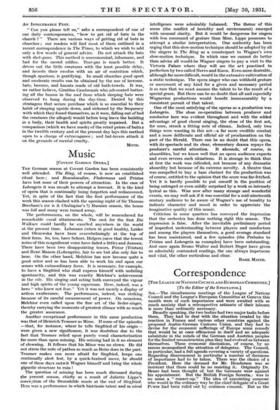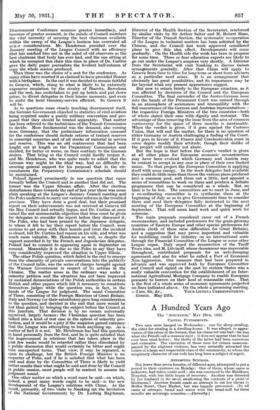Correspondence
[THE LEAGUE OF NATIONS COUNCIL AND EUROPEAN COMMITTEE.]
[To the Editor of the SPECTATOR.} SIR,—The iiinultaneous meetings of the League of Nations Council and the League's -European Committee at Geneva this month- were- of such importance and were awaited with so much anxiety that a retrospective estimate of their labours is more than ordinarily necessary. Broadly speaking, the two bodies had two major tasks before them. They had to deal with the situation created by the reaction in France and various other countries against the proposed Austro-German Customs Union, and they had to devise for the economic sufferings • of- Europe some remedy that would be at once efficacious in itself and an adequate substitute in the minds of the German and _Austrian peoples for the limited reconstruction plan they had evolved as between themselves. These economic discussions, of course, by no means monopolised the attention -of delegates. The Council, in particular, had a full agenda covering a variety of questions. Regarding disarmament in particular a number of decisions of importance had to be taken. There Was the choice of a President. Here the demand for Mr. Henderson was so insistent that there • could be no resisting it. Originally Dr. Bens had been thought of, but the Germans were against his appointment. But the British Foreign Secretakt was in no sense a " runner-up." The idea of appointing someone who would in the ordinary way be the chief delegate of a Great Pcwer had been ruled 'Gilt by common consea. But as the Disarmament Conference assumes greater immediacy, and becomes of greater moment, in the minds of Council members the vital necessity of securing the best chairman available within the sweep of thee's horizon has overruled all infix )r considerations. Mrifafilenderson presided over the January meeting of the League Council with an efficiency that has marked him out in the mind of old observers as the best chairman that body has ever had, and the one sitting at which he occupied this chair this time in place of Dr. Curtius gave the daily paper journalists the liveliest half-column of copy the whole session produced.
Then there was the choice of a seat for the conference. . As many cities have courted it as claimed to have provided Homer with a birthplace. In the end it was decided to remain faithful to Geneva, which, stung to- what is likely to be extremely expensive emulation by the rivalry of Biarritz, Barcelona and the rest, has undertaken to put up hotels and put down prices, to divert delegates in their leisure moments, and even to make the local tramway-service efficient. So Geneva it will be.
As to questions more closely touching disarmament itself, the German Government objected to statistics of civil aviation being required under a purely military convention and pro- posed that they should be treated separately. That .matter has been referred to the technicians of the Transit Commission to decide. More fundamental was the demand, also coming from Germany, that the preliminary information amassed for the conference should include returns of trained reserves in conscript countries and of all stocks of material in service and reserve. This was an old controversy that had been fought out at length on the Preparatory Commission and decided, for better or worse, on lines contrary to the German desires. That being so the Council could hardly reopen it, and Mr.' Henderson, who was quite ready to admit that the German- way might be the ideal way, had no difficulty in securing general support for his proposal that in the cir- cumstance the Preparatory Commission's schedule should be maintained.
Poland figured prominently in one question that came formally before the Council and in anothei that did not. The former was the Upper Silesian affair. After the election disturbances there towards the end of last year there was some plain speaking at the League's January Council meeting and the Poles undertook to carry out various reforms in the troubled province. They have done a good deal, but their promised report on their achievements was not received at Geneva till the May Council had actually begun, and Dr. Curtius at once raised the not unreasonable objection that time must be given for delegates to consider the report before they discussed it.- The Poles, who had been praised by the Japanese delegate, to whom it fell to lay their report before the Council, were anxious to get away with their laurels and treat the incident' as closed, but Dr. Curtius had reason on his side, and what was much more valuable, Mr. Henderson as well, so despite the support accorded it by the French and Jugoslavian delegates, Poland had to consent to appearing again in September on remand. Meanwhile it is due to the Poles to say they have very considerably improved the situation in Upper Silesia.
The other Polish question, which failed in the end to emerge from the obscurity of private conversations into the publicity of the Council table, was the series of charges brought against the Warsaw Government in respect of its actions in the Ukraine. The matter arose in. the ordinary way under a minority petition and the situation has not been improved- by sustained denunciations of the Polish authorities in certain British and other papers which felt it necessary to constitute themselves judges while the question was, in fact, in the hands of the League for judgment. The usual Committee of Three, consisting of the Foreign Ministers of Great Britain, Italy and-Norway (or their substitutes) gave long consideration to the question, and decided in the end that more would be lost than gained by bringing the subject before the Council at this juncture. That decision is by no means universally approved, largely becaus a the Ukrainian question has been talked into a kind of test case in the sphere of minority pro- tection, and it would be a pity if the suspicion gained currency: that the League was attempting- to hush anything up. As a , matter of fact it is not. Mr. Henderson has had this question in hand personally from the first, and he is quite satisfied that
the improvement in relations that has taken place in the
past few weeks would be retarded rather than stimulated by a public discussion that would-certainly be bitter and might take unexpected turns. That view, it may. be repeated, is open to challenge, but the British Foreign Minister is no respecter of Poles, and if he is satisfied that what has been said and done by the Committee of Three is likely to yield - better results than what might be said and done by the Council in public session, most people will be content to assume his judgment sound.
One other matter on which a word must be said—on which, indeed, a -great many words ought to be said—is the new
development of the League's relations with China. As the result, primarily, of two visits to Nanking (at the invitation of the National Government) by Dr. Ludwig Rajchman,
Director of the Health Section of the Secretariat, reinforced by similar visits by Sir Arthur Salter and M. Robert Haas, Director of the Transit Section, the systematic co-operation of the League in technical matters has been solicited by the Chinese, and the. Council last week approved considered plans to give this idea effect. Developments will come gradually. On the Health side the work has been in progress for some time. Three or four education experts are likely to go out under the League's auspices very shortly. A Director from the Secretariat will visit Nanking to discuss liaison arrangements generally. After that China will apply to Geneva from time to time for long-term or short-term advisers as a particular need arises. It is an arrangement that obviously has great possibilities, and its importance may be far beyond what any present appearances suggest.
But now to return briefly to the European situation, as it was affected by decisions of the Council and the European Committee. The final surrender of the Austro-German issue into the hands of the Permanent Court was carried through in an atmosphere of seriousness and tranquillity with the full concurrence of the German and Austrian representatives— the respective Foreign Ministers of the two countries—both of whom stated their case with dignity and restraint. The advantage of thus removing the issue from the area of common controversy for the space of three months is inestimable. When the verdict is given, if it goes against the Customs Union, that will end the matter, for there is 'no question of either Germany or Austria challenging a finding of the Court. If it goes in favour of it France and Czechoslovakia must in some degree modify their attitude, though their dislike of the project will certainly not abate.
But the hope is that before the Court's verdict is given at all other plans for European economic reconstruction may have been evolved which Germany and Austria may be content to accept in any case in place of their own limited union. To that project the European Committee is applying itself with some energy. In the week delegates had available they could do little more than throw the various plans produced into. a common pool, sort them out a little, and appoint a series of committees to work on them and produce a definite programme that can be considered as a whole. But no time is to be lost. The committees are to meet in June, and a co-ordinating committee is to synthesize them at the beginning of July so as to give Governments time to consider them and send their -delegates fully instructed to the next meeting of the European Committee at the beginning of September. That will mean hard work and quick work for someone.
The main proposals considered came out of a French memorandum, and included preferences for the grain-growing countries of Eastern Europe and other special preferences for Austria (both 'of these raise difficulties for Great Britain), and a suggestion that may prove important and valuable for mobilizing credit for industry on an international scale through the Financial Committee of the League or some other League organ. Italy urged the resurrection of the Tariff Truce idea, and M. Litvinoff, whose demeanour was impeccable throughout, contributed proposals for an anti-dumping agreement and also for what he called a Pact of Economic Non-Aggression. One measure that had been prepared in advance and was approved both by European Committee and Council and signed on the spot by sixteen States was a really valuable convention for the establishment' of an Inter- national Agricultural Mortgage Company to enable European peasants to borrow on their land at reasonable rates. That is the first of a whole series of economic agreements projected on lines indicated above. On the whole a promising meeting.







































 Previous page
Previous page